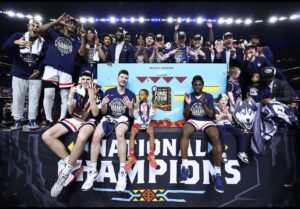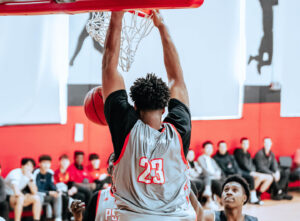Video by: Splash Productions
There was a new name on the whiteboard in PSA basketball coach Tom Espinosa’s office toward the end of summer, at the bottom of the list of others who were already committed to the school and seen as potential Prep-level players. An interested party noticed it there, pointed to it, and said, “Justin Johnson…what’s his deal?” Associate head coach Josh Scraba, in the office with Espinosa at the time, answered: “Could be the kid who helps us win another national championship. Or he could be the kid who blows the whole thing up. We’ll find out.”
Justin Johnson knew what everyone knew about him. Or what they thought they knew about him. He had heard the labels, unsure really of where they were stemming from, but that they were stuck to him like a proverbial scarlet letter: Bad kid. Bad teammate.Disrespectful. Doesn’t work. Hot headed. Stuck in his own ways. Uncoachable.
Whether they started back home in Miami or at his previous school in Arizona or somewhere else, they affected Johnson. “It’s hard, especially at first. These things are not me,” he said recently, about midway through his post grad year at Putnam Science Academy. “I’m not a bad guy. I’m not perfect, I know that. I have made mistakes. But the word that was put out on me is not the truth at all.”
Johnson grew up in a notorious area of Miami, the son of Kim Hicks – a former basketball standout at Florida Atlantic University who played professionally overseas – and Melvin Johnson – a former basketball standout at Charlotte who also played professionally overseas. His parents divorced when he was in fifth grade, and while Johnson has a relationship with his dad, he says that his focus is on his mom, older brother (Kameron), and younger sister (Ariel). “My mom, that’s my queen. She did it all on her own, she made it work,” he said. “It was tough, but that’s life. My mom would just get up every day and find a way. Take three kids to three different schools and then get herself to work on time. Every day. I just want to bless my momma one day, give her the spotlight she deserves, bless my family.” Johnson was the driver when he got into a serious car accident two years ago, totaling his mom’s car. He still has the key though, as it serves as a reminder of a promise he made to her to one day replace the car. He has dreams of making that happen by playing in the NBA, and Espinosa and Scraba both say that he has a chance, and group him among the most talented players the Mustangs have ever had, guys like Hamidou Diallo, Tyson Etienne, and Scoochie Smith, who have all either been in the league or on the fringe of it. His fallback plan is to pursue something in his other passion – fashion, perhaps even having his own clothing line.
First though, there’s the matter of college. And his recruitment. And dealing with all the labels. They have undoubtedly hurt his recruitment, as college coaches are skeptical to spend time and energy on someone whom they have heard is not worth it. But Johnson is not a bad kid. One PSA staff member tells a story of taking videos at practices and games that are posted to social media. Johnson will text the staff member and politely ask for the videos. “He’ll write, ‘Hi, I saw those videos posted, could you please send them to me?’” the staff member said. “In the past, kids would just text or come up to me and say, ‘You’ve got to send me those videos,’ or ‘I need those, send them to me.’ I didn’t think they were being disrespectful, but Justin is being outwardly and noticeably respectful. And then after I send them, he’ll respond with ‘thank you’ or ‘I appreciate you.’ Every time.” Frank Taylor, Johnson’s Spanish teacher, said the same thing. “When I talked to him about things he needs to work on – focusing in more, needing extra help, if he’s on his phone a little too much – he responds very well,” Taylor said. “He’s a very respectful, kind person. He does his work, he always says thank you. Not a bad kid at all, in anyway.” Johnson credits his mom for teaching him respect. That’s why those related labels bother him.“Disrespectful and bad attitude?” he said. “That’s never been me. My mom would never let me be like that. She played the mom role and the dad role in my life. She taught me respect, on and off the court. She taught me treat people the right way, treat them the way I want to be treated.”
His reputation as a bad teammate has missed the mark at PSA as well. To a man, his teammates speak well of him. Good dude. Chill dude. Funny. Supportive. Wants to win. Wants to help the team win. Humble. Quiet. “I had heard that people were talking that he was a bad dude, you wouldn’t want him as a
teammate,” Fallou Gueye said. “I haven’t seen that at all. He’s not that. Justin’s a great guy. He’s a cool guy, he’s not talking bad about anyone or anything. He’s trying to get everybody together. I love having him as a teammate. He’s humble, he pushes people to be better. Great teammate. The way he acts with us, there’s none of that other stuff.”
At a recent home game in which another PSA team was playing, most of the Prep players in attendance were sitting or standing along the stage on one baseline. Johnson though was sitting by himself along the sideline near midcourt. “To an outsider who thinks they know what he’s about, they’d think that’s him not wanting to be part of the group or being a bad teammate,” teammate Cris McElveen said. “But if you know Justin and know who he is and what he’s about, that’s not what that was. Yeah, he’s quiet and. can keep to himself, but that’s him. No one looked at it like we’re over here and he’s over there. “Some days you’re more into being with everybody and some days you want to just be with yourself.”
The tag of being uncoachable is what bothers him the most though. Johnson loves the game, in part because of the confidence it instills in him. “I just love the game of basketball,” he said. “It brings me joy. It’s something I’m good at and can improve on and continue to be good at. I just love to see myself be consistent with
something in life. So for people to say that I’m uncoachable… if someone is teaching me the game, especially a better version of the game, I always love to pick up and learn that. I’m not perfect, on or off the court. I can do things better, I know that. But I want people to know that I have a strong love and strong drive for this game and I plan on taking myself far with it.”
Said Espinosa: “He’s a good kid, he’s very coachable, he’s respectful, he’s grateful, he’s been a good teammate. If we win another national championship, it’ll be because of him, not in spite of him.”
Johnson played his first three years of high school at Miami Dade High School, then transferred to Donda Academy in Los Angeles for his senior year to gain more national exposure. When Donda closed down before the season even started, Johnson had to move on, ending up at Hillcrest Prep in Arizona. He is now at PSA for a post grad year. But again, people on the outside will see he was at Miami Dade, then Donda, then Hillcrest, now PSA and make assumptions. “He wasn’t bouncing around. But I think it added to the perception that he couldn’t be coached,” said Andy Lemoine, who was one of Johnson’s coaches in Miami (where some of the negativity comes from) and has known him for nearly five years. “I’m not saying there aren’t things he could do better. But I don’t think his transgressions are the end of the world, certainly not to the point where college coaches should be hearing ‘Don’t touch him.’ It’s a growing process, and the growth that I’ve seen in him has been astronomical.”
As he works through all the off-the-court negativity, Johnson has shown dramatic growth on the court as well. He’s always been a scorer, and he averages a team-leading 17.5 points per game. But he also leads PSA in steals, is third in assists, and has become one of the team’s energy guys. “It’s night and day on defense since we started,” Espinosa said. “We talked to him about working hard on defense, about buying in on that end. And just watch him play now… he’s always getting steals, he’s flying around the court. He’s a motor guy. It’s been awesome to see his growth. Is he perfect? No. Can he still be better? Yes. But that’s every kid.” When he has made mistakes, he has been held accountable. For instance, he’s not necessarily late to meetings or practice, but he’s not always on time either. Espinosa subscribes to the school of thought that if a meeting is at 12, it starts at 11:55. If you’re there at 12, you’re late. “He wasn’t skipping meetings or practice, and he would be maybe 30 seconds late,” Espinosa said. “But he was late.” As a result, Johnson lost his spot in the starting lineup. He accepted his punishment, but his first game coming off the bench, on January 19, didn’t go well. “I was in my head that game. It bothered me because I wasn’t getting it,” Johnson said. “But they have to hold me accountable. I know my purpose on the team. I’m not here for myself and my own accolades. We’re trying to win and do something special, and we do that as a team.”
In his next four games off the bench, Johnson averaged 24.2 points. He scored 32, including 25 in the second half, to lead PSA’s rally from a 19-point deficit to a win over Bradford on January 27. “Here’s what I can tell you,” Scraba said. “I was skeptical at first. I got calls in April about him coming here. I turned him down. Calls in May, turned him down. June, July, turned him down. When I got a call again in August, we had a spot left and we looked at it as upside. His back was basically up against the wall. “But I’m happy I took the risk. I can’t say that loud enough. I’m glad we took the risk and I tell every college coach that they’ll be glad they take the risk too.”




